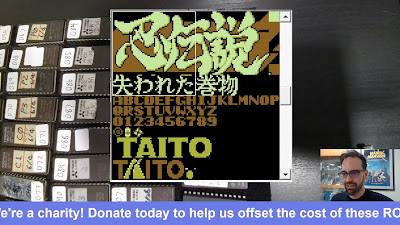It's been a decade since I discovered an old television news report on developer K-Byte, and it's been a year since I wrote a post about that report, but someone finally came forward with a name for that mystery C64 game I noticed: It's Narnia for the Commodore 64 and Apple II, one of a series of two games based on The Chronicles of Narnia by C.S. Lewis. Now you can go back to whatever you were doing...
 |
| A K-Byte programmer working on Narnia for the Commodore 64? |
Oh, wait, there's more...Referred to as an Interface game, an attempt to blend board games and video games, Narnia includes physical dice and cards to be used during play. It's doing the VCR board game thing before those were a thing. Or maybe it's doing the Magnavox Odyssey thing. Of course, the game can't detect what's on the dice or cards, so you're basically on the honor system. Ideally, you'd be playing this with your family, but we'll get into what you do with the dice and cards in a little bit.
I don't know much about the Narnia books, but I can tell you Narnia is based specificially on The Lion, the Witch, and the Wardrobe. (The book was even included with the game.) It consists of two stages, or "Adventures." In the first "Adventure," the player must find the beavers that wander around the screen. Each beaver gives you a heart for what is essentially your life meter, which you'll need for the next "Adventure."
Dwarves also wander the stage. Running into them takes you to a "Dwarf Battle" in which the dwarf thinks of a random number, and you must roll your dice and get a higher number to win. Of course, you could just make up a number, but that would be wrong.
The stage ends when you get 10 hearts, the Witch captures Edmund (who appears on-screen at the same time as the Witch and automatically goes to her), or you run out of time.
Adventure Two takes place in the Ice Maze. The goal is to reach Aslan the Lion, but you'll have to go through doors and avoid the Witch's crystals to get to him. Each door leads to a prompt to draw a card from your deck. Type the letter ("code") printed on the card to be taken to one of eight "Card Sub-Adventures," most of which are mini-games that involve rolling the dice.
 |  |
| Screenshots from the Commodore 64 version (Source: MobyGames) | |
There are a few different names on the title screen. Word, Inc./Word Publishing was a Christian book publisher that was owned at the time by ABC Publishing, a subsidiary of the American Broadcasting Company, and was the publisher of this game. The Episcopal Radio/TV Foundation held the film and game rights to The Chronicles of Narnia.
Gruen Studios was board game designer Paul Gruen's company, so the board game elements should be no surprise. Gruen designed many board games including two based on the Narnia books, but his best known was probably Pay Day, originally from Parker Brothers. Presumably Gruen designed the two computer games, and K-Byte wrote the software, but there's no hint of K-Byte's involvement other than the news report.
 |
| Title screen, Commodore 64 version (Source: MobyGames) |
As for the second game, it was called Dawn Treader, and I think you'll find it looks a lot like Narnia. So if K-Byte developed Narnia, then they probably developed that, too.
Link of Interest:
Narnia on the Museum of Computer Adventure Game History


